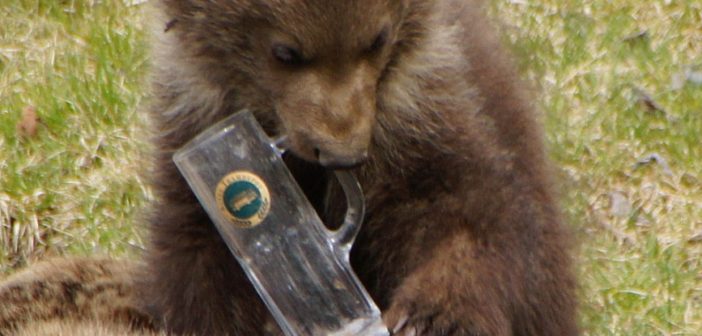 Russia’s been hot news throughout cyberspace this past year, and the Feb. 27 assassination of opposition leader Boris Nemtsov has only heightened the hubbub. Putin’s stealth invasion of the Ukraine back in 2014 put him under worldwide scrutiny and, once again, US-Russian relations are far from peachy.
Russia’s been hot news throughout cyberspace this past year, and the Feb. 27 assassination of opposition leader Boris Nemtsov has only heightened the hubbub. Putin’s stealth invasion of the Ukraine back in 2014 put him under worldwide scrutiny and, once again, US-Russian relations are far from peachy.
But for animal activists and drug and alcohol counselors, there’s more important matters at hand.
Caged and Confused
If you think it’s bad to be an alcoholic as a homo sapien, try being an alcoholic bear confined to a trash-ridden cage. A restaurant in Sochi—the city that hosted the 2014 Winter Olympics and helped expose Russia’s dismal infrastructure—has been keeping two bears captive for 20 years, while feeding them tons of booze. Dzhenkis Uzaroshvili, the owner of the Patskhu-Guria restaurant, claims that it’s good for the bears because of the frigid climate.
Okay, he might have a point. But video footage tells a very sad story, one that animal activists are trying to rewrite.
According to Anna Kogan, founder of Britain’s Big Hearts Foundation, “There are drunken people who come to the restaurant, park their cars in front of the bears and throw things to the animals so that they get drunk and behave funnily. They are held in cages—and have been blinded by the car lights.” She adds that “Bears have a stronger reaction to alcohol than humans—they can die.”
Kogan has fought legally to have the bears removed from Uzaroshvili’s ownership so they can rehabilitate from their alcohol addiction as well as find a humane home. But most rescue joints throughout Europe have denied the bears admittance because of their alcohol problem.
“It’s very expensive to look after bears in this condition, and many centers just don’t have the funds,” Kogan says.
Hunting is responsible for the mistreated bears. After Russia’s spring hunt, many cubs are left without mommy and daddy and when they venture out into the world, some idiots adopt them as pets. Then, once they’re too large to be kept inside, they lock them up in cages, a practice that seriously needs to be quashed.
Escape to Romania
The good news is Big Hearts has teamed up with France’s Brigitte Bardot Foundation to pay for and coordinate the bears’ exodus to Libearty—a bear sanctuary in Romania. Yes, the French and the Brits are playing nice to ensure these abused animals are rescued. The bear haven is a 1.5-acre forest enclosure, complete with a water pool, a den and ethereal oak trees, where the bears can wander freely.
The bad news is that legal red tape will keep them in Russia for up to three months and, until they can move to Romania, they’ve got to find a temporary home. And none of Russia’s zoos will take them. Big Hearts Foundation is the only group pleading with the Russian parliament to pass laws that would protect animals’ welfare by criminalizing animal abuse and putting an end to animal testing for cosmetics.
Helpless Animals Are Not Entertaining
Inhumane treatment of animals is obviously widespread throughout the globe, which is why we’ve got organizations like PETA, the ASPCA and The Humane Society working tirelessly to prevent jerks like Dzhenkis Uzaroshvili, and his jackass patrons, from feeding bears beer. How or why anyone would want to enslave helpless animals for entertainment’s sake is confounding, but the sad truth is this is an age-old practice of humans.
It’s too bad those bears didn’t go into a violent blackout, break free from their cages, and maul the sons of bitches responsible for their captivity.
Photo courtesy of Martin Abegglen from Bern, Switzerland (beer or bear) [CC BY-SA 2.0 (https://creativecommons.org/licenses/by-sa/2.0)], via Wikimedia Commons (resized and cropped)
Sponsored DISCLAIMER: This is a paid advertisement for California Behavioral Health, LLC, a CA licensed substance abuse treatment provider and not a service provided by The Fix. Calls to this number are answered by CBH, free and without obligation to the consumer. No one who answers the call receives a fee based upon the consumer’s choice to enter treatment. For additional info on other treatment providers and options visit www.samhsa.gov.




